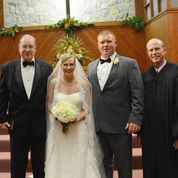 In September of 2013, a national study on stress was released which identified and ranked the “top 10 most stressed cities in America”. The study involved 250,000 respondents and focused on various indicators of stress. Charlotte, NC, came in at #10. To my surprise, Greenville, SC, came in at #1.
In September of 2013, a national study on stress was released which identified and ranked the “top 10 most stressed cities in America”. The study involved 250,000 respondents and focused on various indicators of stress. Charlotte, NC, came in at #10. To my surprise, Greenville, SC, came in at #1.
At first I dismissed the study as absurd. But then I began to think about the lives of those individuals and families in Greenville I know, those within and as well as beyond my congregation. “Yep, they’re very stressed… and yep, her life is crazy right now… and yep, we’ve been trying to get dinner with them for three months but there’s no room in our schedules…”
I have my doubts about whether Greenville really is the most stressed city in America. But I do not doubt that the life being pursued by residents of Greenville, Charlotte, and many other places, is an exceedingly stressful one.
Ask someone how they’re doing, and it’s not unusual to hear them say “things have been crazy busy this past week,” or “life has been so hectic recently,” or “we’ve had so much going on it’s been insane,” or “I just feel completely overwhelmed.” I’ve used those words and phrases myself.
It’s worth listening to these words.
The word “crazy” can be traced back to the 1570’s, when it meant “diseased, sickly.” A decade later it meant “full of cracks and flaws,” and by the 1610’s it meant “of unsound mind, and behaving so.” As for the word “hectic”, it comes from “hectic fever”, used to describe the kind of fever associated with tuberculosis, accompanied with a rapid pulse. It was first used in 1904 to refer to feverish and disorganized activity. “Insane” means, literally, “not well”. And as for “overwhelmed”, that comes from the 1300’s, meaning “to turn over completely,” and then a century later meaning “to submerge completely.”
My concern is that our use of these words to describe our lives may not be too far off the mark. According to Psychology Today, “The average high school kid today has the same level of anxiety as the average psychiatric patient in the 1950’s.”[2] What much of our culture considers a “normal pace of life” is, in fact, unsound, not well, and submerging us completely. And it shows on a weekly, if not daily, basis. We find ourselves consistently too distracted to worship, pray, and read Scripture; too overcommitted to find an evening for dinner with friends; and too busy to respond to the unexpected needs of our neighbor.
The Problem of Over-commitment
In Luke 14:15-24, Jesus tells a parable about several people who are invited to a great banquet. Initially they have all said, “Oh yes, we’ll come!” But when the day of the banquet arrives, each of them has an excuse.
Strikingly, none of their excuses involve anything inherently sinful. One has bought a field, another has bought some oxen, and a third has married a wife. But each of these things becomes, for them, a preoccupation that takes priority over attending and enjoying the banquet. For spurning the invitation to the great banquet, they suffer condemnation: “For I tell you, none of those men who were invited shall taste my banquet” (v. 24).
The banquet is a metaphor for the kingdom of God, in which we know and enjoy God together with the fellowship of the saints. Many of us formally accept the invitation to the kingdom by our profession of faith, but consistently excuse ourselves from partaking of the kingdom because, in each instance, we are too preoccupied with other things. We may excuse ourselves as simply being in “one of those busy seasons of life”, but in reality we are cutting ourselves off from God Himself.
As Kevin DeYoung puts it: “For most of us, it isn’t heresyor rank apostasy that will derail our profession of faith. It’s all the worries of life.” He adds, “Busyness kills more Christians than bullets”.
From the standpoint of the Scriptures, and of our lives in light of the kingdom, we must see that over-commitment is no small matter: busyness is serious business.
The Path Out of Over-Commitment
 The two main verbs of the Christian life are “believe” and “repent”, and the path out of over-commitment follows the tracks of these two verbs.
The two main verbs of the Christian life are “believe” and “repent”, and the path out of over-commitment follows the tracks of these two verbs.
We must believe two things.
First, we must believe that Jesus has crown rights over every aspect of our lives, and most definitely over our schedules and commitments. D. A. Carson has observed, “Many who profess faith seem to think that Christianity is something to add to their already busy lives, not something that controls, constrains, and shapes their vision and all their goals.” We must believe that the commitments we make, and the calendars we fill, have everything to do with our lives as disciples of Jesus.
Second, we must believe that God never calls someone to do more than He gives them time to do. The truth of that should strike us as self-evident (although I must confess it was Chris Lundegaard, in his book The Enemy Within, who opened my eyes to this). This means that if you don’t presently have enough time for everything you’re doing and ought to be doing (including time for worship, fellowship, and rest), there is one undeniable conclusion: you, my friend, are doing more than God has called you to do. Do you believe that?
And we must repent.
We need to ask ourselves, with prayer and humble honesty, why we have taken on so much. For at root of most busyness is the age-old and soul-killing sin of pride – we want others to think a certain way about us (“she’s so helpful!”), or we want to think a certain way about ourselves (“I’m needed, they can’t do it without me”). Or we can’t bear the thought of others being disappointed in us, so we lack the wherewithal to say “no”. Or we can’t bear the thought of our kids not doing all the activities everyone else’s kids are doing (even though the studies show most kids wish their lives were simpler, and that mom and dad were less stressed). We must ruthlessly ask of all of our commitments, “Why did I really agree to do that?”
In keeping with repentance, some of us may need to admit that we cram our days full in order to keep disquieting thoughts at bay. Peter Kreeft keenly observes: “We want to complexify our lives. We don’t have to, we want to. We want to be harried and hassled and busy. Unconsciously, we want the very things we complain about. For if we had leisure, we would look at ourselves and listen to our hearts and see the great gaping hole in our hearts and be terrified, because that hole is so big that nothing but God can fill it.” Are you someone who needs to read that again?
Believing and repenting, we should then take stock of our commitments. Take 5-10 minutes to write down everything you’re doing. And I mean everything – church commitments, community involvement, extra work-related responsibilities, carpool, coaching, season tickets, leisure activities. Then ask of each commitment, “Am I doing this because I’m confident God has called me to do it?” and mark each one with, “Yes”, “No”, or “Not Sure”.
If the answer is “no”, ask yourself what really motivated you to take that on, and devise a plan for how to offload it from your schedule (it may be by simply letting a term of service expire without recommitting to it, or delegating a responsibility, or you may need to resign from something).
You may be surprised to see how much the things you don’t feel called to do are draining precious time and energy from the things you do feel called to do. Thank the Lord that you have the opportunity to right the ship, and recommit yourself to those things that you know He has called you to pursue. This may mean re-establishing a daily routine of time in the Scriptures, or reclaiming uninterrupted time with your family, or reconnecting with old friends, or recovering the passion you used to have in using your spiritual gifts for the building up of your congregation.
It may also mean creating time in your schedule for the unexpected.
Margin for Love
 Dr. Richard Swenson, a Christian medical doctor, has written on the importance of having “margin” in our lives. He defines margin as “the space between our load and our limits.” We prize margin in our finances, but how many of us prize margin in our calendars?
Dr. Richard Swenson, a Christian medical doctor, has written on the importance of having “margin” in our lives. He defines margin as “the space between our load and our limits.” We prize margin in our finances, but how many of us prize margin in our calendars?
Swenson writes that “the past might have been poor and deprived in many respects, but its people had margin.” In the days before television, telephones, cars, and daily newspapers, and before churches were offering “twenty simultaneous programs,” people had more time. And that, says Swenson, meant “time to help a neighbor.”
The parable of the Good Samaritan shows us a man in need, and it shows another man going about his day who stopped to help him. Among the things the Good Samaritan had that day, one of them was time. His schedule wasn’t too packed. He wasn’t too rushed to get to his destination. He had margin in his schedule to love his neighbor, to meet an unexpected need.
Here again I wonder if our busyness is sometimes our way of unconsciously protecting ourselves from the inconvenient needs of our neighbors. The Saturday Night Live character, Jack Handy, once quipped: “Whenever I go anywhere, I like to carry two sacks. That way if anyone says, ‘Hey, do you have a hand?’ I can say, ‘Sorry, got these sacks.’”
We see a need, but say to ourselves, “Too bad I’m so busy.”
Let me ask you – if you were to clear your schedule of over-commitment, and even build into your schedule some “margin”, who would most benefit? It may be a family member whom you know would benefit from more of your attention. It may be a visitor in your church you’ve been wanting to have over for a meal. I suspect in many cases, you would be the one who would most benefit from a more streamlined schedule (since you would have time to be still, time to pray and read, time to face questions you’ve been avoiding, etc.).
But it may also be that the person who would most benefit is someone you haven’t even met yet – someone on your road to Damascus whose need everyone can plainly see, but who’s being passed over by the rest of our overcommitted culture.
In the end, changing your schedule from crazy to concentrated, from insane to sane, from hectic to healthy, isn’t about becoming a more peaceful or more disciplined person. In the end, it’s about loving God and loving our neighbor. And, as Jesus taught, on these two commandments hang all the law and the prophets.
Rev. Matthew Miller is the pastor of Greenville ARP Church, SC. This article was part of his study “Rhythms of Rest” which he used during the Greenville ARP Church Retreat. Matt and Lindsay have two children.

